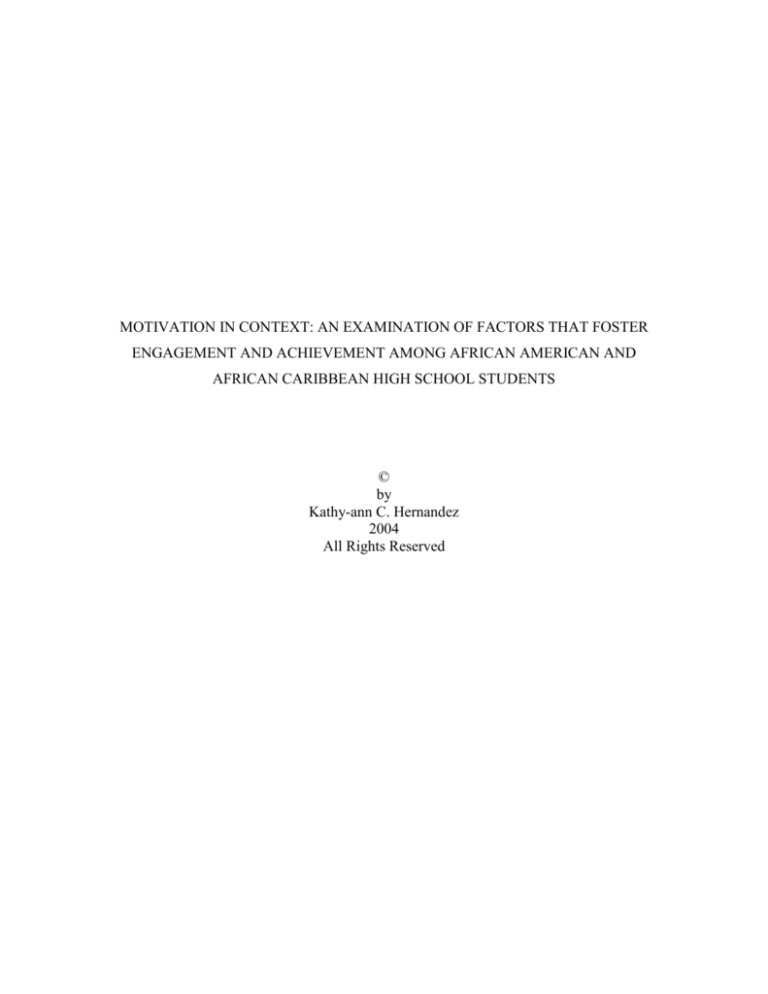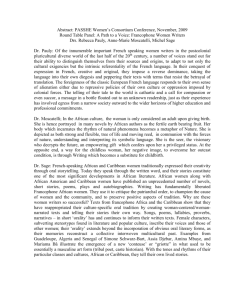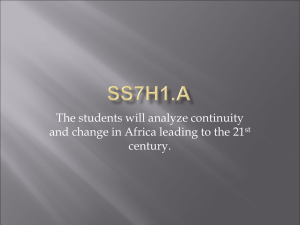
MOTIVATION IN CONTEXT: AN EXAMINATION OF FACTORS THAT FOSTER
ENGAGEMENT AND ACHIEVEMENT AMONG AFRICAN AMERICAN AND
AFRICAN CARIBBEAN HIGH SCHOOL STUDENTS
©
by
Kathy-ann C. Hernandez
2004
All Rights Reserved
INTRODUCTION
Statement of the Problem
The academic motivation of students is a critical national issue. Since the 1970s,
the National Assessment of Educational Progress (NAEP) has revealed a steady decline
in nationwide performance of high school students on standardized achievement tests.
Steinberg (1996b) found that instead of reporting active engagement in schoolwork, one
third of a group of 20,000 adolescents declared that they spent most of the day in school
“goofing off with their friends.” More than one third admitted that they rarely try hard
or pay attention in school. Researchers have concluded that declining achievement
reflects a general decline in student interest in education and motivation to achieve in the
classroom (Davidson, 1996; Steinberg, 1996b).
The motivation–achievement connection is more than a national issue; it is an
international dilemma. In other parts of the world, concerns have been raised not
necessarily about the motivation of students, but specifically about the motivation and
achievement of boys (Connell, 1996). In the Caribbean region, among a predominantly
African Caribbean population, educators are questioning the lack of interest and
underachievement of males in academia (Drayton, 1995; Miller, 1991; Parry, 2000).
Similar trends have been reported in the United Kingdom, especially among students of
African Caribbean descent (Pulis, 2000).
Lack of academic motivation is evident in student disengagement from the
educational process and the resultant poor academic performance. Disengaged students
exert minimal effort on academic tasks, are inattentive, cut class, demonstrate low levels
1
of task persistence, and have high incidences of disciplinary problems (Ekstrom, Goertz,
Pollack, & Rock, 1986; Finn, 1989). Generally, students who demonstrate such
behaviors also have poor academic records and are likely to drop out of school (Connell,
Halpern-Flesher, Clifford, Crichlow, & Usinger, 1995; Newmann, Wehlage, &
Lamborn 1992).
In studies examining the motivation–engagement–achievement link, race1, social
class, and gender have emerged as important status-based characteristics. Data confirm
that Asian American adolescents score high on level of engagement and achievement,
followed by Whites, and then African American and Latino adolescents (Chen &
Stevenson, 1995; Steinberg, 1996b). Children from low-income households are
especially at-risk for underachievement. But African American and Latino students are
more likely than other racial groups to come from such households (Gillock & Reyes,
1999; Gutmann & Eccles, 1999; National Center for Education Statistics [NCES], 1998).
On average, girls, regardless of race, appear to be doing better academically than boys,
but this gender gap is more pronounced among African American students (American
Association of University Women [AAUW], 1999). The emerging profile of a student
most vulnerable to academic disengagement and underachievement is that of a poor,
Black male or female.
Research has shown that the academic motivation of students is the product of
status-based characteristics and contextual realities (Murdock, 1993; Weiner, 2000).
The niches that students occupy based on their race, gender, or social class can
predispose them to experience negative or positive motivational contexts. In this respect,
1
Race refers to physical features that characterize one as belonging to a particular racial group and selfidentification with that group.
2
parents, teachers, peers, and the economic context affect students’ academic motivation
(Murdock, 1999; Wilson, 1987).
Several race-comparative studies have been conducted in the United States that
identify background factors that predict motivation and engagement (e.g., race, social
class, and gender). But few empirical race-homogenous studies have explored the
intricate relations between status-based characteristics, motivational contexts, and the
outcomes of academic motivation among the most at-risk population--Blacks. Even
fewer studies have attempted a cross-cultural examination of these variables among this
population.
To understand academic motivation in students of African descent, it is necessary
to consider how status-based and contextual factors work together to place these students
in an at-risk category. This study is designed to explore these processes among Black
students from two cultural contexts, the United States (U.S.) and the British Virgin
Islands. (B.V.I.).
Rationale
This study will clarify academic motivational processes in Blacks by addressing
three important issues relevant to psychological research among this population: (a) race–
class confounds, (b) research design and purposes, and (c) conceptual understandings of
the role of social context in psychological research.
One of the challenges in studying engagement and achievement among African
American students is the problem of race–class confounds. African Americans are
overrepresented among the low income strata in United States society. Research that
3
does not clearly separate the impact of race and social class on achievement may falsely
attribute differences in level of achievement to a particular racial group.
The inundation of the field of educational psychology with race-comparative
studies further exacerbates race–class confounds. Several studies compare a large group
of White middle class students to a disproportionately small group of middle class
Blacks, and a correspondingly large group of lower class Blacks to a small group of
lower class Whites (Graham, 1992, 1994). Additionally, studies involving Blacks have
been criticized for failure or weak attempts to methodologically assess social class as a
confounding variable (Cauce, Ryan, & Grove, 1998; Murdock, 2000).
Race-comparative studies generally serve a descriptive function by quantifying
differences between Blacks and Whites on selected measures. With respect to an
understanding of within-group variations in psychological functioning among Blacks,
they provide little information. Graham (1994) notes that few empirical racehomogenous studies have been conducted in the field of psychology to aid our
understanding of “systematic patterns of feeling and thinking in this population that also
might have broad applications to human behavior and achievement strivings” (p. 108).
Ironically, it is this group that is most at-risk for underachievement.
Of necessity, motivation–engagement–achievement linkages cannot be studied
outside of social context (Weiner, 1990). But attempts to study motivational processes
among African Americans that control for context by equating socioeconomic status
(SES) across Black and White populations, do not facilitate an understanding of the
compounded effects of race and social class. It has been argued that the reality of White
4
privilege in spite of SES is a form of social capital for Whites, which Blacks do not
possess (Scheurich, 1993).
The present zeitgeist in the field of educational psychology, to study individuals
in context, demands that we do more than control for SES if we are to understand how
social context mitigates achievement strivings (Murdock, 2000; Pintrich, 2000).
Motivational processes are defined by the intricate interplay of psychological and
sociological realities; attempts to study psychological phenomena must simultaneously
attend to both.
Accounting for psychological and sociological factors is a challenge for the field.
Acceptance of this challenge demands a broadening of the traditional purposes for
psychological research to not only seek an understanding of psychological processes in
carefully controlled settings, but to seek an understanding of how these processes operate
in real world situations. This conceptualization of motivation as situated in context has
been accompanied by growing support for the view that a mixture of both qualitative and
quantitative approaches is needed to capture the complexity of this construct (Anderman
& Anderman, 2000; Pintrich, 2000; Volet, 2001).
The design of the present study can be useful in addressing the critical issues
mentioned above. First, the within-group design provides flexibility in understanding
psychological functioning in Blacks without having to address race confounds. Second,
it advances empirical research specific to psychological functioning in a population in
need of such efforts. Since participants belong to the same racial group, the focus can
shift from an attempt to quantify differences between African American and African
Caribbean students on selected measures, to an examination of how other personal and
5
contextual factors foster motivational outcomes for these students in each context. Third,
a mixed method approach is used to understand the complexity of situated academic
motivation.
Purpose of the Study
The purpose of the study was to examine the relationships between status-based
characteristics (gender and social class), students’ perceptions of their school related
motivational contexts (parents, peers, teachers, and economic), indicators of academic
motivation (achievement motivation, school engagement, and noncompliance), and
achievement. The primary focus was to delineate these relations at work among two
cultural/ethnic2 groups of high school students—African Caribbean and African
American. Differences based on cultural/ethnicity were not the central focus of this
study. The objective was to examine similarities and/or differences in the relationships
among the selected variables in each context.
Research Questions
The following research questions guided the data collection and analyses:
1. Are there significant differences in students’ academic motivation indicators
(achievement motivation, school engagement, and noncompliance) as a function
of status-based differences (social class and gender) in the United States and the
British Virgin Islands?
2
Cultural/ethnicity is used to distinguish individuals who may belong to the same racial group but
who retain the cultural uniqueness of their national origin.
6
2. Are there significant differences in student achievement as a function of statusbased differences (social class and gender) in the United States and the British
Virgin Islands?
3. Are there significant differences in students’ perceptions of school related
motivational contexts (parents, peers, teachers, and economic) as a function of
status-based differences (social class and gender) in the United States and the
British Virgin Islands?
4. Is the combination of variables that predict achievement for males and females in
the United States similar to the combination of variables that predict achievement
for males and females in the British Virgin Islands?
5. How do students describe their academic motivational processes and school
related motivational contexts in the United States and the British Virgin Islands?
Research Hypotheses
Based on the research questions, the following hypotheses were generated:
1. Significant differences exist in students’ level of academic motivation as a
function of status-based differences. Females and higher SES students will
demonstrate significantly higher levels of achievement motivation and academic
engagement, and lower levels of noncompliance than their corresponding
comparison groups in each context.
2. Significant differences exist in student achievement as a function of status-based
differences. Females and higher SES students will demonstrate significantly
7
higher levels of achievement than their corresponding comparison groups in each
context.
3. Significant differences exist in students’ perceptions of school related
motivational contexts (parents, peers, teachers, and economic) as a function of
status-based differences in the United States and the British Virgin Islands.
Females and higher SES students will report significantly more positive
motivational contexts than males and lower SES students in both contexts.
4. The combination of variables that predict achievement for males and females in
the United States is similar to the combination of variables that predict
achievement for males and females in the British Virgin Islands.
Theoretical Framework
This study begins with an acknowledgment of the hybridization of psychological
and sociological perspectives to an understanding of academic motivational processes.
This relationship is expressed in Lewin’s (1936) field theory formula: B = f (P, E), where
every psychological event (B) is surmised as being a function of both the state of the
person (P) and the environment (E).
The underlying premise is that social class and gender affect the efficacy and type
of interpersonal dynamics (real or perceived) that influence achievement strivings. The
emphasis is on how status-based characteristics and the social worlds of students combine
to influence their motivation, engagement, and achievement through intrapersonal
psychological processes. This assertion is based on my agreement with researchers who
posit that an understanding of the combined role of personal and contextual influences is
8
central to a study of motivational processes (Graham, 1997; Murdock, 1993; Weiner,
2000; Volet, 2001).
These issues have been explored with respect to engagement and achievement
among African American students relative to other African American students, but
comparisons have been made primarily to Caucasian students. This study seeks to
understand these processes among Blacks from different cultural/ethnic backgrounds.
Two psychological frameworks form the conceptual base of this study: (1)
expectancy-value theories of human motivation (Atkinson, 1964; Weiner, 1985, 2000),
and (2) an ecological theory of human development (Bronfenbrenner, 1979).
Delimitations and Limitations of the Study
Limited empirical research on motivational processes has been conducted with
African Caribbean adolescents. Since the theoretical basis for this study is predominantly
informed by studies conducted with other populations, a priori relationships established
for African American and Caucasian adolescents may prove inaccurate for this sample.
This study does not attempt to identify specific cultural/ethnic factors that affect
motivation. Unanticipated variations in how geographic and cultural contexts affect
school operations, parental support, peer group, and societal and economic values prevent
conclusive comparisons between African American and African Caribbean students. But
the self-report student data provide insights into what students think about their schooling
irrespective of cultural context. It is this perception that is the basis for articulating
similarities and/or differences in students’ opinions about their school experiences.
9
The samples in this study were taken from one school in the U.S. and B.V.I.,
respectively. Therefore, generalizations based on the findings should be advanced with
caution.
Significance of the Study
The phrase “no child left behind” confirms that quality education is a social
imperative for all. Disengaged students and those who drop out of school eventually
experience the dire consequences of limited education. Without a high school diploma,
dropouts are more likely than graduates to face a future defined by poverty,
unemployment, and delinquent or criminal activity (Steinberg, 1996a).
Student disengagement and underachievement also have adverse economic
implications. Underachievement of African American students places them in
unfavorable positions in the job market. This can severely limit the pool of qualified
African American employees in years to come. Similarly, Caribbean economies depend
heavily on human resource potential. Careful planning is needed to prepare capable
personnel to fill future jobs and propel developing economies.
Race-comparative studies have been conducted with American adolescents to
clarify racial differences in school engagement and achievement. But very few crosscultural studies have been conducted to advance our understanding of student
engagement as a universal construct, especially as it relates to the Black population.
Continued research in various contexts with specific populations is required.
This study also adds clarity to the majority/minority status or discrimination explanation
of academic disengagement among African Americans (Ogbu, 1997; Steele, 1997).
10
Given the striking differences in situational contexts, the emerging data can provide
information with respect to similarities and/or differences in factors that foster school
engagement in the two samples. This information can be useful to educational planners
seeking to address declines in students’ academic motivation.
11










